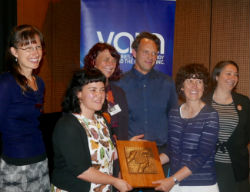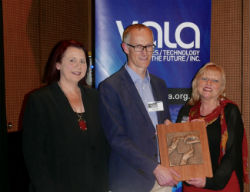The joint winners of the 2016 VALA Award are:
- National Library of Australia – edeposit service

A one-stop-shop for publishers, the edeposit service is the public interface of an end-to-end digital collection management system, fully integrated with other NLA systems, enabling Australian publishers to deposit Australian digital publications in accordance with the new legal deposit provisions of the Copyright Act.Alison Dellit, Director, Australian Collection Management, and her colleagues Meredith Batten, Julie Watson, Kate Ross & Brendan McKinley were present to receive the award.
- Listen to the recording
- University of Melbourne – data forensics lab

The development of this service and lab is a first nationally for an academic library and a response to a growing demand to access and extract valuable research data and files from now obsolete systems and media. The Data service and forensics lab offers a range of services for examining, analyzing, recovering, re-using and preserving data stored in digital media in a forensically sound manner. The Data Forensics Lab can process a variety of modern and legacy computer storage media using state of the art purpose built hardware and software.Peter Neish, Research Data Curator, Digital Scholarship and Donna McRostie, Associate Director, Research Information Management University Library were present to receive the award.
- Listen to the recording
- View the presentation slides
Other nominations
We wish to acknowledge other institutions who submitted entries:
- Deakin University Library for “Communication in Context”
Communication in Context is an innovative project that involved the custom design and development of a software platform to support an assessment task, employing a multidisciplinary team of leading students recruited from the Schools of Information Technology and Education at Deakin University. The platform will be useful for any online roleplaying activities, in addition to the assessment task it was designed to support.
- La Trobe University Borchardt Library for “Escape Room at the Library”
Escape Room at the Library is an engaging and interactive game. It is La Trobe University Library’s new and innovative approach to orientation for university students which brings together the digital and physical environments and capitalises on the internationally popular game, Escape Rooms.
- La Trobe University Research Commons
The Research Commons is a highly specialised, dedicated research collaboration space which includes a massive Visualization wall, a specialised Creative Studio, a number of break out rooms and shared, flexible, collaboration spaces. This space serves as a central, accessible and expert meeting, work and consultation space for La Trobe scholars and higher degree research students and as a key facility to attract research funding and industry partnerships. It provides a discipline-neutral space where there is expertise available to help researchers to get the best out of the technology.
- Newcastle LibraryCivic Digest for the Library Culture Cafe and Bar
Civic Digest was created to bridge culture and digital consumption. Civic Digest embraces that opportunity that exists for Libraries to innovate and become the great explainers! It is a partnership between Newcastle Region Library and major performing arts venue in the region, Civic Theatre, also owned and managed by Council. The Café is in the heart of Newcastle’s civic precinct located within the corner space of the Civic Theatre building. It brings leading edge library services into the spaces where people connect over coffee or pre/post theatre performances.
- University of South Australia for Technology enabled enquiry services delivery
This innovation consists of flexible, customisable library services where customers can engage seamlessly with the Library on demand, regardless of their location and device. At the centre of this are novel mobile and wireless technologies which make library services more visible and accessible in the physical and digital environments. Service desks have been replaced with diverse modes of accessing advice and assistance, such as proactive chat, video conference, screen share capabilities, email, telephone and the UniSA Student app. During peak times staffed library “pop ups” are set up in locations most occupied by students and service delivered via mobile devices.


